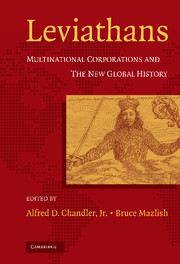Book contents
- Frontmatter
- Contents
- List of Figures and Tables
- Acknowledgments
- List of Contributors
- Introduction
- PART ONE THE SCOPE OF THE MULTINATIONAL PHENOMENON
- PART TWO CULTURAL AND SOCIAL IMPLICATIONS OF MULTINATIONALS
- PART THREE THE GOVERNANCE OF MULTINATIONALS
- 7 Governing the Multinational Enterprise: The Emergence of the Global Shareowner
- 8 The Financial Revolutions of the Twentieth Century
- 9 Multinational Corporations, the Protest Movement, and the Future of Global Governance
- Conclusion
- Index
8 - The Financial Revolutions of the Twentieth Century
Published online by Cambridge University Press: 17 August 2009
- Frontmatter
- Contents
- List of Figures and Tables
- Acknowledgments
- List of Contributors
- Introduction
- PART ONE THE SCOPE OF THE MULTINATIONAL PHENOMENON
- PART TWO CULTURAL AND SOCIAL IMPLICATIONS OF MULTINATIONALS
- PART THREE THE GOVERNANCE OF MULTINATIONALS
- 7 Governing the Multinational Enterprise: The Emergence of the Global Shareowner
- 8 The Financial Revolutions of the Twentieth Century
- 9 Multinational Corporations, the Protest Movement, and the Future of Global Governance
- Conclusion
- Index
Summary
In the search to understand the power and extent of multinational corporations, an important piece of the puzzle relates to what we call “financial revolutions”; seen in the context of global history, we seek to understand the process of globalization in historical perspective. In dealing with the financial revolutions involved in the dramatic growth of multinationals – especially in the second half of the 20th century – we are telling a story of how capital has been amassed and concentrated so as to finance the kinds of enterprises that characterize the global epoch itself. It is the story of how capital has been, and is, transferred from those who have it to those who have been creating the global enterprises.
In the wake of these revolutions, as the new Leviathans – the multinational corporations (MNCs) – grow in size and influence, so does the pressing need to hold them accountable in ways that go beyond a mere bottom line. That story of accountability has tended to focus on multinationals themselves and thus to neglect financial instruments and institutions initiated by the MNCs or by outside attempts to regulate them that would circumscribe or circumvent their actions.
Much attention has been given to how the information and transportation revolutions have contributed to the growth of MNCs, and how they have provided the necessary infrastructure for a global economy.
- Type
- Chapter
- Information
- LeviathansMultinational Corporations and the New Global History, pp. 203 - 218Publisher: Cambridge University PressPrint publication year: 2005
- 1
- Cited by



